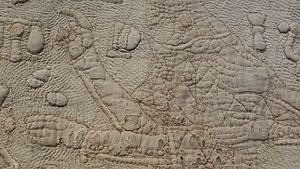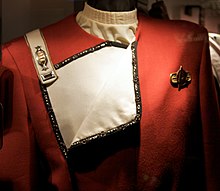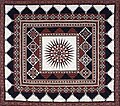Trapunto quilting


Trapunto, from the Italian for "to quilt", is a method of quilting that is also called "stuffed technique". A puffy, decorative feature, trapunto utilizes at least two layers, the underside of which is slit and padded, producing a raised surface on the quilt.
History
[edit]The style originated in Italy before the 14th century.[2]
Technique
[edit]Trapunto is often confused with the relatively similar techniques used in making traditional whole cloth Provençal quilts that were developed from the 17th century onwards in France.[3]
Earliest
[edit]One of the earliest surviving examples of trapunto quilting is the Tristan Quilt in the Victoria and Albert Museum, a linen quilt representing scenes from the story of Tristan and Isolde which was made in Sicily during the second half of the 13th century.[4] Another piece of the Tristan Quilt, thought to be from a pair to the V. & A.'s example, is in Palazzo Davanzati in Florence.[4]
Modern
[edit]The technique was used for the inner-tunic collars worn in Starfleet uniforms from Star Trek II: The Wrath of Khan. As of the 1980s, functional trapunto machines were rare, and the specialized needles which they employed were even rarer.[citation needed]
References
[edit]- ^ Anderson, Kay (1982). "'Star Trek II: The Wrath of Khan': How the TV series became a hit movie, at last". Cinefantastique. 12 (5–6): 50–74.
- ^ Art:Quilts and Quilters:Techniques:Trapunto
- ^ Etienne-Bugnot, Isabelle. "Quilting in France: The French Traditions". Retrieved 2010-05-02.
- ^ a b The Tristan Quilt in the collections of the Victoria and Albert Museum, London. Accessed 5-2-2010
External links
[edit] Media related to Trapunto at Wikimedia Commons
Media related to Trapunto at Wikimedia Commons

